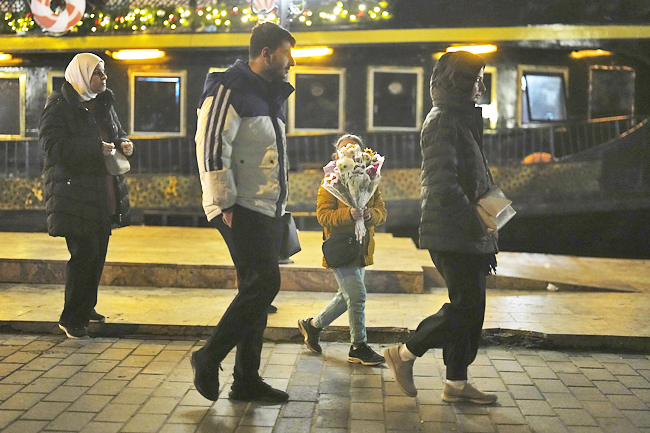ISTANBUL (AP) — In a dim one-room apartment in one of Istanbul’s poorest neighbourhoods, 11-year-old Atakan Sahin curls up on a threadbare sofa with his siblings to watch TV while their mother stirs a pot of pasta.
The simple meal is all the family of six can look forward to most evenings. Atakan, his two younger brothers and five-year-old sister are among the one-third of Turkish children living in poverty.
“Look at the state of my children,” said Rukiye Sahin, 28. “I have four children. They don’t get to eat chicken, they don’t get to eat meat. I send them to school with torn shoes.”
Persistently high inflation, triggered by currency depreciation and unconventional economic policies that President Recep Tayyip Erdogan pursued but later abandoned, has left many families struggling to pay for food and housing. Experts say it’s creating a lost generation of children who have been forced to grow up too quickly to help their families eke out an existence.
According to a 2023 joint report by UNICEF and the Turkish Statistical Institute, about seven million of Turkiye’s roughly 22.2 million children live in poverty.
That deprivation is brought into stark focus in neighbourhoods such as Istanbul’s Tarlabasi, where the Sahin family lives just a few minutes’ walk from Istiklal Avenue, a tourism hot spot bristling with brightly lit shops and expensive restaurants.


Meanwhile, the Sahins eat sitting on the floor of their room — the same floor Rukiye and her husband sleep on while their children occupy the room’s sofas. In the chilly early December night, a stove burns scraps of wood to keep them warm. They sometimes fall asleep to the sound of rats scuttling through the building.
Atakan spends his days helping his father scour dumpsters in search of recyclable material to earn the family a meagre income.
Poor children in Istanbul also earn money for their families by selling small items such as pens, tissues or bracelets at the bars and cafes in the city’s entertainment districts, often working late into the night.
“I can’t go to school because I have no money,” he said. “We have nothing. Can you tell me how I can go? On sunny days, when I don’t go to school, I collect plastic and other things with my father. We sell whatever we find.”
The cash helps buy basic foodstuffs and pay for his siblings to attend school. On the days Atakan can attend, he is ill-equipped to succeed, lacking proper shoes, a coat and textbooks for the English class he loves.
The Sahins struggle to scrape together the money to cover the rent, utilities and other basic expenses as Turkiye’s cost-of-living crisis continues to rage. Inflation stood at 47 per cent in November, having peaked at 85 per cent in late 2022. Prices of food and non-alcoholic drinks were 5.1 per cent higher in November than in the previous month.
Under these circumstances, a generation of children is growing up rarely enjoying a full meal of fresh meat or vegetables.
Rukiye and her husband receive TRY6,000 (USD173) per month in government welfare to help towards school costs, but they pay the same amount in rent for their home.
“My son says, ‘Mum, it’s raining, my shoes are soaking wet.’ But what can I do?” Rukiye said. “The state doesn’t help me. I’m in this room alone with my children. Who do I have except them?”
Although the government allocates billions of lira to struggling households, inflation, which most people agree is far above the official figure, eats into any aid the state can give.
In districts such as Tarlabasi, rents have risen five-fold in recent years due to gentrification in central Istanbul that puts pressure on the housing market for low-income families.
Experts say welfare payments aren’t enough for the millions who rely on them, forcing many parents to make impossible choices: Should they pay the rent or buy clothing for the children? Should they send them to school or keep them home to earn a few extra lira?


